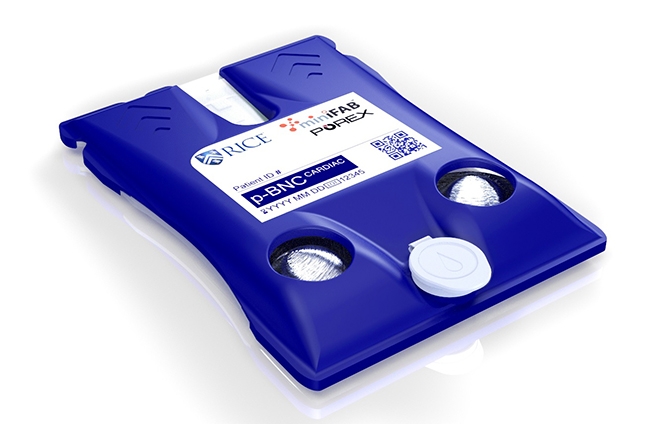Programmable lab-on-chip advancing in trials

A digital device the size of a credit card could provide a diagnosis in just minutes for a huge range of conditions.
The programmable bio-nano-chip (pBNC), developed by John McDevitt of the McDevitt Research Group at Rice University in Houston, Texas, offers the possibility to diagnose conditions at the point of care, including cancer, cardiovascular disease and infectious conditions.
The technology is part of a new generation of point-of-care diagnostics under development which could mean an end to having to wait days for a lab result based on blood or biopsies, with doctors instead able to produce results in their consultation room.
The chip is set to be one of the highlights at this year’s American Association for Clinical Chemistry (AACC) Annual Scientific Meeting.
Developed in 2013, the credit card-sized pBNC relies on the analysis of specific biomarkers found in bodily fluids by a high performance imaging platform. Results from the analysis can be given in a few minutes and displayed through a smartphone app.
The ‘programmable’ aspect of the chip comes from the core analysed interface which can be adapted to look for different conditions.
The chip is currently in six separate clinical trials investigating its ability to diagnose ovarian, prostate and oral cancer as well as cardiac disease and drug abuse.
The technology has already attracted funding from the National Institute of Dental and Craniofacial Research (NIDCR) division of the National Institute of Health, the Bill and Melinda Gates Foundation, and the Cancer Prevention Research Institute of Texas (CPRIT), amongst others to further develop the platform.
The chip was also a runner-up in the 2013 Nokia Sensing XCHALLENGE – a $2.25 million global competition aimed at accelerating the availability of sensing technology that could improve health and well-being.
On-chip technology is an emerging market in the healthcare field that promises to revolutionise the way diagnostic processes and treatment are performed. Numerous on-chip models are currently under development in various academic institutes including micro-environment chips that replicate specific tissues that help with drug testing.
The point of care diagnostics market is expected to grow rapidly over the next 5-10 years as new products come to market, however most technologies still have much to prove. The most notorious example of this has been Theranos, a company which claimed its technology could revolutionise blood tests, only for it to emerge that the company was relying on traditional testing methods.











